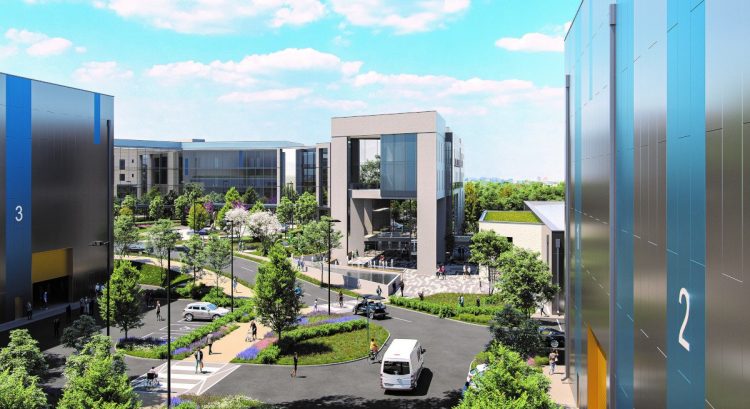Mullingar will provide the planned Hammerlake Studios film campus with a strong pipeline of tech talent, say its developers.
As film-making tech continues to evolve, careers in the industry are changing to reflect this. Streaming services, consumer habits and the pandemic have all had an impact on how the movie sector uses tech.
Now, Ireland is set to get a major new film studio which will employ hundreds of people – many in tech roles. Mullingar in Co Westmeath has been earmarked as the location for Hammerlake Studios.
Once completed, the studios will play a big role in the international film, TV and streaming industry. Westmeath County Council has already approved the planning application and the development is subject to a final vote of approval in September.
The first phase is due to commence operations in the first quarter of 2024. It will employ 350 people in production and 300 construction workers. Phase one will consist of four studios or ‘sound stages’ suitable for large-scale film and television production, data technology centres and editing rooms. Other amenities such as food, fitness and admin buildings will also be added.
The second phase is expected to bring job creation to over 1,000 by 2025. After details of the project broke earlier this week, SiliconRepublic.com spoke to the studio’s director of development and operations, Tom Dowling, about the role tech – and local talent – will play in the undertaking.
Dowling has worked in the film industry for several years. During the pandemic, he noticed how the technology was being used by the industry changed. Like most industries, film-makers were curtailed by public health restrictions put their energy into tech as a way of satisfying audiences.
While green screen will always be used, according to Dowling, the industry is moving to VR. It is borrowing from some of the tech used by gaming companies, which means that if you work in games development, chances are your skills will be in demand in the film industry too.
‘I think Mullingar is the right place. It’s got a young and educated workforce’
– TOM DOWLING
Hollywood has been using software traditionally used by games companies for some time now. Dowling gave the example of The Mandalorian TV series from 2019, which was filmed using Unreal Engine. The show’s creator, John Favreau, worked with Unreal Engine’s developer Epic Games. They used a massive wraparound LED screen with a moving background image projected onto it. The actors were placed in front of the screen.
“That’s been done several times since,” said Dowling. The industry has dubbed the method ‘shooting in the volume’.
The method obviously slashes production costs as you can set it all up without leaving the studio. “It’s probably the biggest leap in technology in the last couple of years,” said Dowling.
However, Dowling also said that there are still tweaks to be made. “What they’re still trying to figure out is how to have the highest resolution screen that you can possibly have and making the camera work with that. So, when an actor moves from right to left, the camera and the screen move in tandem, so the perspectives change as you move about the stage. It’s been good, but they’re still tweaking it. It’ll be another year or two, I think, before they’ll have perfected that.”
Animators from the gaming world will be crucial to fine-tuning this technology in the coming years, according to Dowling. They will work with traditional film animators to generate the images used in the background for shooting in the volume.
Dowling, who used to work at Troy Studios in Limerick, is confident that Mullingar will be able to provide Hammerlake Studios with a strong pipeline of talent. He said that for the first few years, Hammerlake will bring in a lot of its experienced camera and tech talent from Dublin. But it will also train up local graduates from nearby colleges such as the TU of the Shannon. Dowling and his team are working with the TU to develop syllabi on courses that will prepare people to work in these new film tech jobs.
“I think Mullingar is the right place. It’s got a young and educated workforce there. We believe we can find enough people to upskill them and train them up in terms of the film sector roles that they would need to do,” said Dowling. He added that his team did search a number of sites before settling on Westmeath.
“We didn’t want to be in Dublin because there is a talent pool in Dublin, but you’re just pulling from one to another,” he explained. “We wanted to be at a place where we could generate and create our own talent pool and try and hold on to that. The other part of that was we didn’t want to be involved in traffic congestion.”
He likened the local support for the project thus far to “pushing an open door”. He is confident the project will achieve final approval to bring employment to the area.
So, will Hammerlake Studios be a significant player in the international film scene in 10 years’ time? It will be before then, according to Dowling. People’s insatiable desire for content is what’s driving the project. With projections estimating the development will generate up to €50m of annual revenue for Mullingar, it sounds like it won“t be long before Westmeath County Council says lights, camera, action.
10 things you need to know direct to your inbox every weekday. Sign up for the Daily Brief, Silicon Republic’s digest of essential sci-tech news.
Source by www.siliconrepublic.com





























